 https://www.getfulltextresearch.com/wp-content/uploads/2025/03/chris-montgomery-smgTvepind4-unsplash-e1742990522430.jpg
545
800
Tracy Gardner
https://www.getfulltextresearch.com/wp-content/uploads/2023/01/getftr-colour-B.svg
Tracy Gardner2025-03-26 14:58:542025-03-26 15:01:27GetFTR Joins Key Industry Webinars in April: Retractions, Streamlined Access & Syndicated Usage
https://www.getfulltextresearch.com/wp-content/uploads/2025/03/chris-montgomery-smgTvepind4-unsplash-e1742990522430.jpg
545
800
Tracy Gardner
https://www.getfulltextresearch.com/wp-content/uploads/2023/01/getftr-colour-B.svg
Tracy Gardner2025-03-26 14:58:542025-03-26 15:01:27GetFTR Joins Key Industry Webinars in April: Retractions, Streamlined Access & Syndicated Usage
GetFTR and SeamlessAccess – How can these services help speed the researcher journey?
Researchers have more ways than ever to find the research articles they need, with a multitude of content discovery services delivering a constantly updated list of articles. Researchers, however, still face frustration when trying to access the articles that the discovery services return. A maze of publisher websites, entitlements, and authentications take valuable time that researchers could be spending on their work. GetFTR and SeamlessAccess are two services which offer solutions to related but separate problems faced by researchers. Understanding how these services differ is key to ensuring that researchers are supported throughout their access journey.
While SeamlessAccess focuses on simplifying and unifying the login experience on publisher’s websites, GetFTR’s focus is on those platforms and tools where our users begin their search for research. GetFTR is fully compatible with any of today’s existing research discovery tools, scientific collaboration networks, or library management systems. Any system where someone conducts a search across the published literature is eligible for GetFTR integration, and GetFTR is already in use by more than 11 integrators and counting, including popular services like Mendeley, Dimensions and the Researcher app.
When a user performs a search on a discovery service that has integrated with GetFTR, an entitlement check is conducted for all participating publishers and a GetFTR smart link is added to the content which they are entitled to access, based on their institutional affiliation. With GetFTR, a user working on campus or remotely needs to log in via their institution, to access any content their institution has subscribed to across all participating publishers.
GetFTR is in use by eight publishers currently – Springer Nature, Wiley, the American Chemical Society, Taylor & Francis, Elsevier, Karger, Future Science Group, and the American Society of Civil Engineers, with more joining soon. We firmly believe the best possible outcome for researchers is widespread adoption of GetFTR, and are actively engaging new publisher and integrator members. GetFTR also provides publishers with an option to offer an alternative version of an article to users who are not entitled. Such alternative versions could be read-only renditions of the version of record, pointers to preprints, links to author accepted manuscripts, or other formats. The decision on whether or not to provide such alternative versions will be at the discretion of each publisher.
SeamlessAccess and GetFTR can be used individually or together. SeamlessAccess is focused on enabling federated authentication. GetFTR can build on top of SeamlessAccess to more easily identify what institution should be checked for entitlements. SeamlessAccess is designed for use cases outside of scholarly publishing, while GetFTR is currently more narrowly focused. SeamlessAccess enables digital authentication through the leveraging of an existing single-sign-on infrastructure through one’s home institution. When using SeamlessAccess, a user will not have to sign on to any individual publisher sites, relying instead on an authentication enabled by their university or research institution. Once a user has selected their home institution, that choice is stored in their browser, and participating publisher sites can populate a login button with that choice, eliminating the identity provider discovery step.
While GetFTR and SeamlessAccess differ in their technology and offerings, both services have much in common. Both prioritize their users’ privacy and security, working directly with publisher’s websites and institutional systems to ensure the safety of user data. Both also are committed to easing the researcher access journey, making it easier and faster for researchers to access what they need.
If you are interested in learning more about these exciting initiatives, please reach out to Heather Staines at either heattherstaines@seamlessaccess.org or heather@getfulltextresearch.com.
MORE NEWS
 https://www.getfulltextresearch.com/wp-content/uploads/2025/03/chris-montgomery-smgTvepind4-unsplash-e1742990522430.jpg
545
800
Tracy Gardner
https://www.getfulltextresearch.com/wp-content/uploads/2023/01/getftr-colour-B.svg
Tracy Gardner2025-03-26 14:58:542025-03-26 15:01:27GetFTR Joins Key Industry Webinars in April: Retractions, Streamlined Access & Syndicated Usage
https://www.getfulltextresearch.com/wp-content/uploads/2025/03/chris-montgomery-smgTvepind4-unsplash-e1742990522430.jpg
545
800
Tracy Gardner
https://www.getfulltextresearch.com/wp-content/uploads/2023/01/getftr-colour-B.svg
Tracy Gardner2025-03-26 14:58:542025-03-26 15:01:27GetFTR Joins Key Industry Webinars in April: Retractions, Streamlined Access & Syndicated Usage https://www.getfulltextresearch.com/wp-content/uploads/2025/03/business-executives-writing-sticky-notes-scaled-e1741693751201.jpg
500
800
Tracy Gardner
https://www.getfulltextresearch.com/wp-content/uploads/2023/01/getftr-colour-B.svg
Tracy Gardner2025-03-11 12:24:092025-03-11 12:26:20Insights from Researcher to Reader
https://www.getfulltextresearch.com/wp-content/uploads/2025/03/business-executives-writing-sticky-notes-scaled-e1741693751201.jpg
500
800
Tracy Gardner
https://www.getfulltextresearch.com/wp-content/uploads/2023/01/getftr-colour-B.svg
Tracy Gardner2025-03-11 12:24:092025-03-11 12:26:20Insights from Researcher to Reader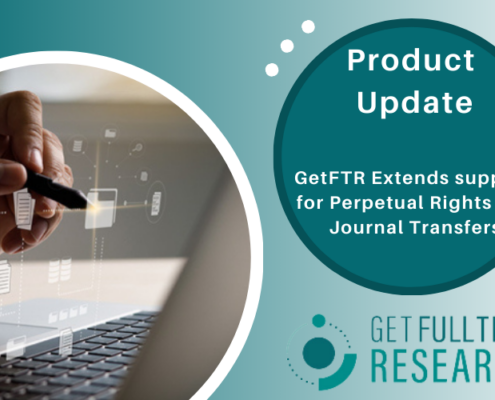 https://www.getfulltextresearch.com/wp-content/uploads/2025/03/product-update2.png
500
800
Tracy Gardner
https://www.getfulltextresearch.com/wp-content/uploads/2023/01/getftr-colour-B.svg
Tracy Gardner2025-03-05 11:47:292025-03-05 11:47:34GetFTR Expands Support for Perpetual Rights and Journal Transfers
https://www.getfulltextresearch.com/wp-content/uploads/2025/03/product-update2.png
500
800
Tracy Gardner
https://www.getfulltextresearch.com/wp-content/uploads/2023/01/getftr-colour-B.svg
Tracy Gardner2025-03-05 11:47:292025-03-05 11:47:34GetFTR Expands Support for Perpetual Rights and Journal Transfers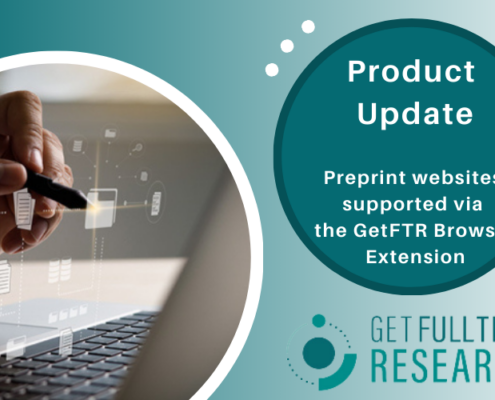 https://www.getfulltextresearch.com/wp-content/uploads/2025/02/product-update-2.png
500
800
Tracy Gardner
https://www.getfulltextresearch.com/wp-content/uploads/2023/01/getftr-colour-B.svg
Tracy Gardner2025-02-07 08:12:042025-02-07 08:55:06GetFTR adds Smartlinks and Retraction and Errata to Preprint Websites
https://www.getfulltextresearch.com/wp-content/uploads/2025/02/product-update-2.png
500
800
Tracy Gardner
https://www.getfulltextresearch.com/wp-content/uploads/2023/01/getftr-colour-B.svg
Tracy Gardner2025-02-07 08:12:042025-02-07 08:55:06GetFTR adds Smartlinks and Retraction and Errata to Preprint Websites https://www.getfulltextresearch.com/wp-content/uploads/2025/01/new-integration-2.png
500
800
Tracy Gardner
https://www.getfulltextresearch.com/wp-content/uploads/2023/01/getftr-colour-B.svg
Tracy Gardner2025-01-28 16:23:452025-01-29 10:06:32APA PsycInfo Integrates GetFTR’s Retraction and Errata Feature
https://www.getfulltextresearch.com/wp-content/uploads/2025/01/new-integration-2.png
500
800
Tracy Gardner
https://www.getfulltextresearch.com/wp-content/uploads/2023/01/getftr-colour-B.svg
Tracy Gardner2025-01-28 16:23:452025-01-29 10:06:32APA PsycInfo Integrates GetFTR’s Retraction and Errata Feature https://www.getfulltextresearch.com/wp-content/uploads/2023/01/new-partner-background.jpg
500
800
Tracy Gardner
https://www.getfulltextresearch.com/wp-content/uploads/2023/01/getftr-colour-B.svg
Tracy Gardner2025-01-09 12:04:172025-01-27 16:52:32Taylor & Francis eBooks Platform Integrates with GetFTR
https://www.getfulltextresearch.com/wp-content/uploads/2023/01/new-partner-background.jpg
500
800
Tracy Gardner
https://www.getfulltextresearch.com/wp-content/uploads/2023/01/getftr-colour-B.svg
Tracy Gardner2025-01-09 12:04:172025-01-27 16:52:32Taylor & Francis eBooks Platform Integrates with GetFTR https://www.getfulltextresearch.com/wp-content/uploads/2024/12/R2R.png
500
800
Tracy Gardner
https://www.getfulltextresearch.com/wp-content/uploads/2023/01/getftr-colour-B.svg
Tracy Gardner2024-12-19 16:41:152024-12-19 16:49:33Going to Researcher to Reader? Don’t forget to sign up for our workshop!
https://www.getfulltextresearch.com/wp-content/uploads/2024/12/R2R.png
500
800
Tracy Gardner
https://www.getfulltextresearch.com/wp-content/uploads/2023/01/getftr-colour-B.svg
Tracy Gardner2024-12-19 16:41:152024-12-19 16:49:33Going to Researcher to Reader? Don’t forget to sign up for our workshop! https://www.getfulltextresearch.com/wp-content/uploads/2023/01/new-partner-background.jpg
500
800
Tracy Gardner
https://www.getfulltextresearch.com/wp-content/uploads/2023/01/getftr-colour-B.svg
Tracy Gardner2024-12-10 15:23:102024-12-10 15:36:01ASM and RSNA Integrate GetFTR to Enhance Access from Article References
https://www.getfulltextresearch.com/wp-content/uploads/2023/01/new-partner-background.jpg
500
800
Tracy Gardner
https://www.getfulltextresearch.com/wp-content/uploads/2023/01/getftr-colour-B.svg
Tracy Gardner2024-12-10 15:23:102024-12-10 15:36:01ASM and RSNA Integrate GetFTR to Enhance Access from Article References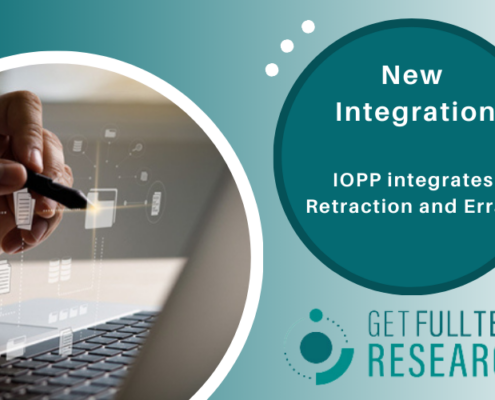 https://www.getfulltextresearch.com/wp-content/uploads/2024/11/new-integration.png
500
800
Tracy Gardner
https://www.getfulltextresearch.com/wp-content/uploads/2023/01/getftr-colour-B.svg
Tracy Gardner2024-11-28 15:46:382025-01-27 16:51:25IOPP integrates GetFTR retraction and errata service to further improve research integrity
https://www.getfulltextresearch.com/wp-content/uploads/2024/11/new-integration.png
500
800
Tracy Gardner
https://www.getfulltextresearch.com/wp-content/uploads/2023/01/getftr-colour-B.svg
Tracy Gardner2024-11-28 15:46:382025-01-27 16:51:25IOPP integrates GetFTR retraction and errata service to further improve research integrity 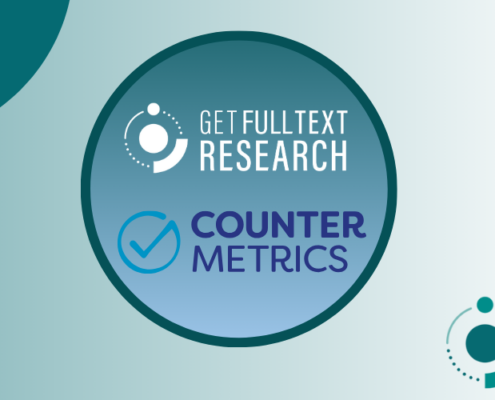 https://www.getfulltextresearch.com/wp-content/uploads/2024/11/Counter-800-x-500-px.png
500
800
Tracy Gardner
https://www.getfulltextresearch.com/wp-content/uploads/2023/01/getftr-colour-B.svg
Tracy Gardner2024-11-21 14:54:252024-11-21 14:57:58Syndicated usage reporting and GetFTR
https://www.getfulltextresearch.com/wp-content/uploads/2024/11/Counter-800-x-500-px.png
500
800
Tracy Gardner
https://www.getfulltextresearch.com/wp-content/uploads/2023/01/getftr-colour-B.svg
Tracy Gardner2024-11-21 14:54:252024-11-21 14:57:58Syndicated usage reporting and GetFTR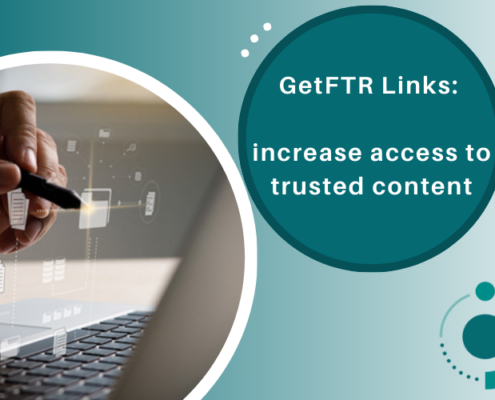 https://www.getfulltextresearch.com/wp-content/uploads/2024/11/increase-in-clicks-800-x-500-px.png
500
800
Tracy Gardner
https://www.getfulltextresearch.com/wp-content/uploads/2023/01/getftr-colour-B.svg
Tracy Gardner2024-11-04 16:13:272024-11-04 16:13:27More Researchers Benefit from GetFTR Links to Trusted Content
https://www.getfulltextresearch.com/wp-content/uploads/2024/11/increase-in-clicks-800-x-500-px.png
500
800
Tracy Gardner
https://www.getfulltextresearch.com/wp-content/uploads/2023/01/getftr-colour-B.svg
Tracy Gardner2024-11-04 16:13:272024-11-04 16:13:27More Researchers Benefit from GetFTR Links to Trusted Content https://www.getfulltextresearch.com/wp-content/uploads/2023/01/new-partner-background.jpg
500
800
Tracy Gardner
https://www.getfulltextresearch.com/wp-content/uploads/2023/01/getftr-colour-B.svg
Tracy Gardner2024-10-24 11:50:192024-10-24 17:05:28SEG Partners with GetFTR to Enhance Research Discovery
https://www.getfulltextresearch.com/wp-content/uploads/2023/01/new-partner-background.jpg
500
800
Tracy Gardner
https://www.getfulltextresearch.com/wp-content/uploads/2023/01/getftr-colour-B.svg
Tracy Gardner2024-10-24 11:50:192024-10-24 17:05:28SEG Partners with GetFTR to Enhance Research Discovery https://www.getfulltextresearch.com/wp-content/uploads/2024/10/measuring-usage-scaled-e1729618494338.jpg
533
800
Tracy Gardner
https://www.getfulltextresearch.com/wp-content/uploads/2023/01/getftr-colour-B.svg
Tracy Gardner2024-10-22 18:44:192024-10-22 18:46:36Measuring Usage via GetFTR
https://www.getfulltextresearch.com/wp-content/uploads/2024/10/measuring-usage-scaled-e1729618494338.jpg
533
800
Tracy Gardner
https://www.getfulltextresearch.com/wp-content/uploads/2023/01/getftr-colour-B.svg
Tracy Gardner2024-10-22 18:44:192024-10-22 18:46:36Measuring Usage via GetFTR https://www.getfulltextresearch.com/wp-content/uploads/2024/09/GetFTR-Case-studies-2.png
1200
1200
Tracy Gardner
https://www.getfulltextresearch.com/wp-content/uploads/2023/01/getftr-colour-B.svg
Tracy Gardner2024-09-30 16:13:362024-11-11 12:10:00APA PsycInfo A&I Integration Experience
https://www.getfulltextresearch.com/wp-content/uploads/2024/09/GetFTR-Case-studies-2.png
1200
1200
Tracy Gardner
https://www.getfulltextresearch.com/wp-content/uploads/2023/01/getftr-colour-B.svg
Tracy Gardner2024-09-30 16:13:362024-11-11 12:10:00APA PsycInfo A&I Integration Experience https://www.getfulltextresearch.com/wp-content/uploads/2023/01/new-partner-background.jpg
500
800
Tracy Gardner
https://www.getfulltextresearch.com/wp-content/uploads/2023/01/getftr-colour-B.svg
Tracy Gardner2024-09-25 17:20:132024-09-25 17:21:39IEEE: latest publisher to join GetFTR
https://www.getfulltextresearch.com/wp-content/uploads/2023/01/new-partner-background.jpg
500
800
Tracy Gardner
https://www.getfulltextresearch.com/wp-content/uploads/2023/01/getftr-colour-B.svg
Tracy Gardner2024-09-25 17:20:132024-09-25 17:21:39IEEE: latest publisher to join GetFTR https://www.getfulltextresearch.com/wp-content/uploads/2024/08/Product-update.png
500
800
Tracy Gardner
https://www.getfulltextresearch.com/wp-content/uploads/2023/01/getftr-colour-B.svg
Tracy Gardner2024-08-04 09:59:372024-08-04 09:59:37GetFTR Browser Extension Update
https://www.getfulltextresearch.com/wp-content/uploads/2024/08/Product-update.png
500
800
Tracy Gardner
https://www.getfulltextresearch.com/wp-content/uploads/2023/01/getftr-colour-B.svg
Tracy Gardner2024-08-04 09:59:372024-08-04 09:59:37GetFTR Browser Extension Update https://www.getfulltextresearch.com/wp-content/uploads/2024/08/Atypon800-x-500-px.png
500
800
Tracy Gardner
https://www.getfulltextresearch.com/wp-content/uploads/2023/01/getftr-colour-B.svg
Tracy Gardner2024-08-03 14:49:342024-08-03 14:59:59Interview with Olly Rickard, Atypon
https://www.getfulltextresearch.com/wp-content/uploads/2024/08/Atypon800-x-500-px.png
500
800
Tracy Gardner
https://www.getfulltextresearch.com/wp-content/uploads/2023/01/getftr-colour-B.svg
Tracy Gardner2024-08-03 14:49:342024-08-03 14:59:59Interview with Olly Rickard, Atypon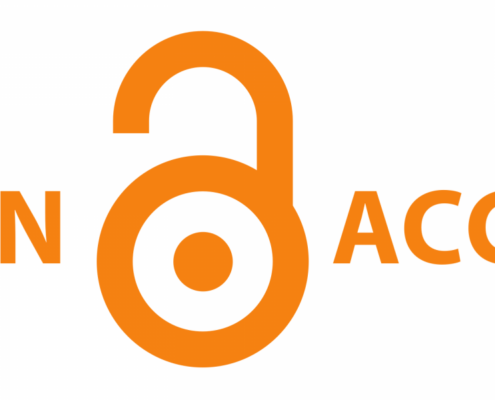 https://www.getfulltextresearch.com/wp-content/uploads/2024/07/open-access-logo-png-transparent-e1720788975687.png
480
1200
Tracy Gardner
https://www.getfulltextresearch.com/wp-content/uploads/2023/01/getftr-colour-B.svg
Tracy Gardner2024-07-12 14:05:042024-07-31 14:55:49GetFTR Enhances Support for Open Access Publishers
https://www.getfulltextresearch.com/wp-content/uploads/2024/07/open-access-logo-png-transparent-e1720788975687.png
480
1200
Tracy Gardner
https://www.getfulltextresearch.com/wp-content/uploads/2023/01/getftr-colour-B.svg
Tracy Gardner2024-07-12 14:05:042024-07-31 14:55:49GetFTR Enhances Support for Open Access Publishers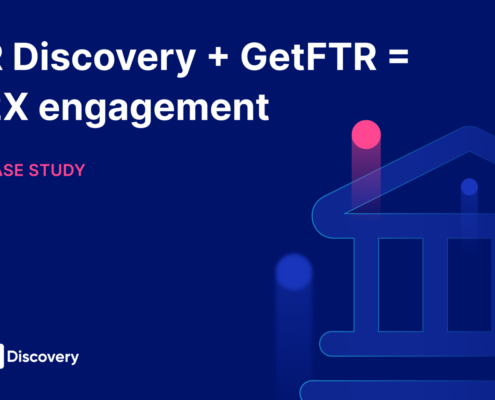 https://www.getfulltextresearch.com/wp-content/uploads/2024/06/Coveri-1536x1024-1-e1722434239514.png
533
800
Tracy Gardner
https://www.getfulltextresearch.com/wp-content/uploads/2023/01/getftr-colour-B.svg
Tracy Gardner2024-06-28 14:13:562024-11-11 12:10:49How R Discovery achieved increased engagement with GetFTR
https://www.getfulltextresearch.com/wp-content/uploads/2024/06/Coveri-1536x1024-1-e1722434239514.png
533
800
Tracy Gardner
https://www.getfulltextresearch.com/wp-content/uploads/2023/01/getftr-colour-B.svg
Tracy Gardner2024-06-28 14:13:562024-11-11 12:10:49How R Discovery achieved increased engagement with GetFTR https://www.getfulltextresearch.com/wp-content/uploads/2024/06/GetFTR-Case-studies-800-x-500-px.png
500
800
Tracy Gardner
https://www.getfulltextresearch.com/wp-content/uploads/2023/01/getftr-colour-B.svg
Tracy Gardner2024-06-24 15:36:242024-06-28 13:58:05Case Study: Thieme’s Integration with GetFTR
https://www.getfulltextresearch.com/wp-content/uploads/2024/06/GetFTR-Case-studies-800-x-500-px.png
500
800
Tracy Gardner
https://www.getfulltextresearch.com/wp-content/uploads/2023/01/getftr-colour-B.svg
Tracy Gardner2024-06-24 15:36:242024-06-28 13:58:05Case Study: Thieme’s Integration with GetFTR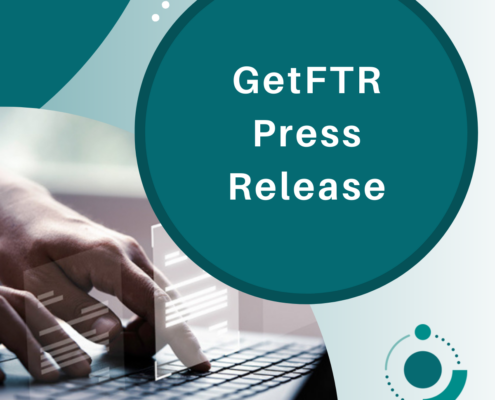 https://www.getfulltextresearch.com/wp-content/uploads/2024/06/Press-Release-tile.png
1200
1200
Tracy Gardner
https://www.getfulltextresearch.com/wp-content/uploads/2023/01/getftr-colour-B.svg
Tracy Gardner2024-06-13 10:44:462024-07-31 11:38:42GetFTR Extends Retraction and Errata Service to All Partners
https://www.getfulltextresearch.com/wp-content/uploads/2024/06/Press-Release-tile.png
1200
1200
Tracy Gardner
https://www.getfulltextresearch.com/wp-content/uploads/2023/01/getftr-colour-B.svg
Tracy Gardner2024-06-13 10:44:462024-07-31 11:38:42GetFTR Extends Retraction and Errata Service to All Partners https://www.getfulltextresearch.com/wp-content/uploads/2023/05/samantha-borges-EeS69TTPQ18-unsplash-scaled.jpg
1707
2560
Tracy Gardner
https://www.getfulltextresearch.com/wp-content/uploads/2023/01/getftr-colour-B.svg
Tracy Gardner2024-06-04 10:54:302024-06-04 12:38:01GetFTR Integrator Webinar: 11th June 2024
https://www.getfulltextresearch.com/wp-content/uploads/2023/05/samantha-borges-EeS69TTPQ18-unsplash-scaled.jpg
1707
2560
Tracy Gardner
https://www.getfulltextresearch.com/wp-content/uploads/2023/01/getftr-colour-B.svg
Tracy Gardner2024-06-04 10:54:302024-06-04 12:38:01GetFTR Integrator Webinar: 11th June 2024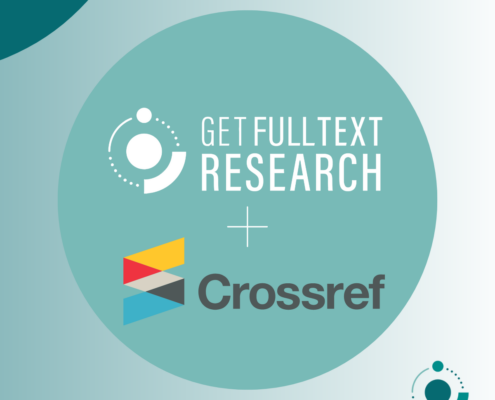 https://www.getfulltextresearch.com/wp-content/uploads/2024/05/Crossref-2.png
1200
1200
Tracy Gardner
https://www.getfulltextresearch.com/wp-content/uploads/2023/01/getftr-colour-B.svg
Tracy Gardner2024-05-05 16:13:012024-07-31 14:39:53Press Release: GetFTR collaborates with Crossref to strengthen research integrity
https://www.getfulltextresearch.com/wp-content/uploads/2024/05/Crossref-2.png
1200
1200
Tracy Gardner
https://www.getfulltextresearch.com/wp-content/uploads/2023/01/getftr-colour-B.svg
Tracy Gardner2024-05-05 16:13:012024-07-31 14:39:53Press Release: GetFTR collaborates with Crossref to strengthen research integrity https://www.getfulltextresearch.com/wp-content/uploads/2023/05/samantha-borges-EeS69TTPQ18-unsplash-scaled.jpg
1707
2560
Tracy Gardner
https://www.getfulltextresearch.com/wp-content/uploads/2023/01/getftr-colour-B.svg
Tracy Gardner2024-04-29 17:58:542024-04-29 18:00:15GetFTR Webinar: Recording and Slides available
https://www.getfulltextresearch.com/wp-content/uploads/2023/05/samantha-borges-EeS69TTPQ18-unsplash-scaled.jpg
1707
2560
Tracy Gardner
https://www.getfulltextresearch.com/wp-content/uploads/2023/01/getftr-colour-B.svg
Tracy Gardner2024-04-29 17:58:542024-04-29 18:00:15GetFTR Webinar: Recording and Slides available https://www.getfulltextresearch.com/wp-content/uploads/2024/04/DSC_3348-e1712232896900.jpg
533
800
Tracy Gardner
https://www.getfulltextresearch.com/wp-content/uploads/2023/01/getftr-colour-B.svg
Tracy Gardner2024-04-04 13:26:032024-04-04 14:21:29Tracy Gardner joins GetFTR as Head of Marketing
https://www.getfulltextresearch.com/wp-content/uploads/2024/04/DSC_3348-e1712232896900.jpg
533
800
Tracy Gardner
https://www.getfulltextresearch.com/wp-content/uploads/2023/01/getftr-colour-B.svg
Tracy Gardner2024-04-04 13:26:032024-04-04 14:21:29Tracy Gardner joins GetFTR as Head of Marketing https://www.getfulltextresearch.com/wp-content/uploads/2024/03/anniversary-scaled-e1711475287174.jpg
1709
2560
Tracy Gardner
https://www.getfulltextresearch.com/wp-content/uploads/2023/01/getftr-colour-B.svg
Tracy Gardner2024-03-27 09:35:322024-03-27 12:16:09Happy 4th Anniversary! How GetFTR is evolving to meet the needs of the research community.
https://www.getfulltextresearch.com/wp-content/uploads/2024/03/anniversary-scaled-e1711475287174.jpg
1709
2560
Tracy Gardner
https://www.getfulltextresearch.com/wp-content/uploads/2023/01/getftr-colour-B.svg
Tracy Gardner2024-03-27 09:35:322024-03-27 12:16:09Happy 4th Anniversary! How GetFTR is evolving to meet the needs of the research community. https://www.getfulltextresearch.com/wp-content/uploads/2024/03/man-giving-business-presentation-using-high-technology-digital-pen-scaled-e1711361459858.jpg
533
800
Tracy Gardner
https://www.getfulltextresearch.com/wp-content/uploads/2023/01/getftr-colour-B.svg
Tracy Gardner2024-03-25 12:15:562024-03-25 12:30:27GetFTR Reports 350% increase in entitlement checks since launch of Browser Extension
https://www.getfulltextresearch.com/wp-content/uploads/2024/03/man-giving-business-presentation-using-high-technology-digital-pen-scaled-e1711361459858.jpg
533
800
Tracy Gardner
https://www.getfulltextresearch.com/wp-content/uploads/2023/01/getftr-colour-B.svg
Tracy Gardner2024-03-25 12:15:562024-03-25 12:30:27GetFTR Reports 350% increase in entitlement checks since launch of Browser Extension https://www.getfulltextresearch.com/wp-content/uploads/2023/05/samantha-borges-EeS69TTPQ18-unsplash-scaled.jpg
1707
2560
Tracy Gardner
https://www.getfulltextresearch.com/wp-content/uploads/2023/01/getftr-colour-B.svg
Tracy Gardner2024-03-13 14:24:162024-03-13 14:33:01Free Webinar: General Update and Information for Librarians
https://www.getfulltextresearch.com/wp-content/uploads/2023/05/samantha-borges-EeS69TTPQ18-unsplash-scaled.jpg
1707
2560
Tracy Gardner
https://www.getfulltextresearch.com/wp-content/uploads/2023/01/getftr-colour-B.svg
Tracy Gardner2024-03-13 14:24:162024-03-13 14:33:01Free Webinar: General Update and Information for Librarians https://www.getfulltextresearch.com/wp-content/uploads/2023/01/new-partner-background.jpg
500
800
Tracy Gardner
https://www.getfulltextresearch.com/wp-content/uploads/2023/01/getftr-colour-B.svg
Tracy Gardner2024-02-29 13:15:062024-03-13 14:26:09Thieme go live and IOPP integrates GetFTR indicators with article references
https://www.getfulltextresearch.com/wp-content/uploads/2023/01/new-partner-background.jpg
500
800
Tracy Gardner
https://www.getfulltextresearch.com/wp-content/uploads/2023/01/getftr-colour-B.svg
Tracy Gardner2024-02-29 13:15:062024-03-13 14:26:09Thieme go live and IOPP integrates GetFTR indicators with article references https://www.getfulltextresearch.com/wp-content/uploads/2024/02/update-software-digital-eletronics-internet-concept-e1707743434453.jpg
512
800
Tracy Gardner
https://www.getfulltextresearch.com/wp-content/uploads/2023/01/getftr-colour-B.svg
Tracy Gardner2024-02-12 13:13:232024-02-12 13:58:35GetFTR Plans for Retraction & Errata
https://www.getfulltextresearch.com/wp-content/uploads/2024/02/update-software-digital-eletronics-internet-concept-e1707743434453.jpg
512
800
Tracy Gardner
https://www.getfulltextresearch.com/wp-content/uploads/2023/01/getftr-colour-B.svg
Tracy Gardner2024-02-12 13:13:232024-02-12 13:58:35GetFTR Plans for Retraction & Errata https://www.getfulltextresearch.com/wp-content/uploads/2024/02/business-people-shaking-hands-meeting-room-e1707150921800.jpg
468
800
Tracy Gardner
https://www.getfulltextresearch.com/wp-content/uploads/2023/01/getftr-colour-B.svg
Tracy Gardner2024-02-05 16:39:522024-02-06 14:10:30Meet us at NISO Plus, R2R, ER&L and UKSG
https://www.getfulltextresearch.com/wp-content/uploads/2024/02/business-people-shaking-hands-meeting-room-e1707150921800.jpg
468
800
Tracy Gardner
https://www.getfulltextresearch.com/wp-content/uploads/2023/01/getftr-colour-B.svg
Tracy Gardner2024-02-05 16:39:522024-02-06 14:10:30Meet us at NISO Plus, R2R, ER&L and UKSG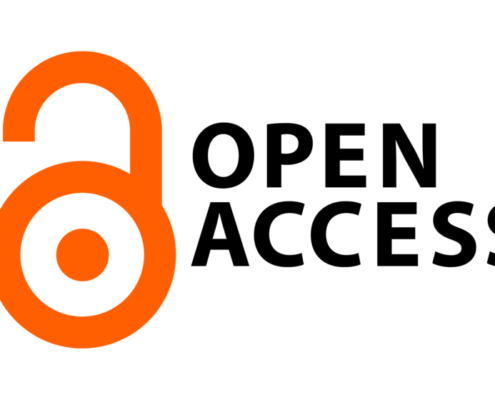 https://www.getfulltextresearch.com/wp-content/uploads/2024/01/Open-Access-logo-e1706703125375.jpg
426
600
Tracy Gardner
https://www.getfulltextresearch.com/wp-content/uploads/2023/01/getftr-colour-B.svg
Tracy Gardner2024-01-31 11:59:312024-02-06 10:29:33GetFTR increases visibility of OA and Free articles
https://www.getfulltextresearch.com/wp-content/uploads/2024/01/Open-Access-logo-e1706703125375.jpg
426
600
Tracy Gardner
https://www.getfulltextresearch.com/wp-content/uploads/2023/01/getftr-colour-B.svg
Tracy Gardner2024-01-31 11:59:312024-02-06 10:29:33GetFTR increases visibility of OA and Free articles
Taylor & Francis Online Streamlines Researcher Access to Cited Articles Through GetFTR Integration
News https://www.getfulltextresearch.com/wp-content/uploads/2023/01/new-partner-background.jpg
500
800
Simon Hicks
https://www.getfulltextresearch.com/wp-content/uploads/2023/01/getftr-colour-B.svg
Simon Hicks2023-12-08 11:17:022024-02-06 10:30:32ASM International, AACR and SciSummary latest to join GetFTR
https://www.getfulltextresearch.com/wp-content/uploads/2023/01/new-partner-background.jpg
500
800
Simon Hicks
https://www.getfulltextresearch.com/wp-content/uploads/2023/01/getftr-colour-B.svg
Simon Hicks2023-12-08 11:17:022024-02-06 10:30:32ASM International, AACR and SciSummary latest to join GetFTR https://www.getfulltextresearch.com/wp-content/uploads/2023/11/8-reasons-checklist.jpg
500
800
Tracy Gardner
https://www.getfulltextresearch.com/wp-content/uploads/2023/01/getftr-colour-B.svg
Tracy Gardner2023-11-23 18:27:232024-03-06 17:05:598 Reasons Researchers should use the GetFTR Browser Extension
https://www.getfulltextresearch.com/wp-content/uploads/2023/11/8-reasons-checklist.jpg
500
800
Tracy Gardner
https://www.getfulltextresearch.com/wp-content/uploads/2023/01/getftr-colour-B.svg
Tracy Gardner2023-11-23 18:27:232024-03-06 17:05:598 Reasons Researchers should use the GetFTR Browser Extension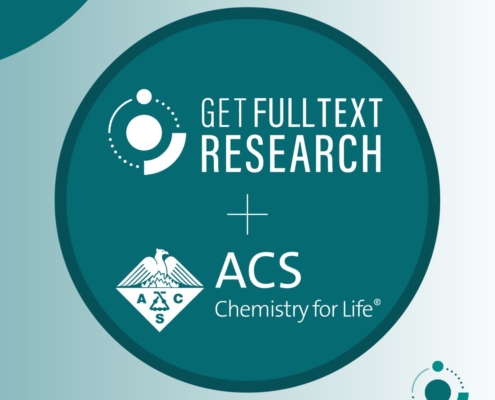
American Chemical Society (ACS) Enhances Researcher Experience with Integration of GetFTR into Article References
News https://www.getfulltextresearch.com/wp-content/uploads/2023/06/growtika-dUMEnARXgJU-unsplash-2.jpg
500
800
Tracy Gardner
https://www.getfulltextresearch.com/wp-content/uploads/2023/01/getftr-colour-B.svg
Tracy Gardner2023-10-31 12:46:022024-03-06 16:52:15GetFTR now works with Google Scholar, PubMed, Web of Science and more
https://www.getfulltextresearch.com/wp-content/uploads/2023/06/growtika-dUMEnARXgJU-unsplash-2.jpg
500
800
Tracy Gardner
https://www.getfulltextresearch.com/wp-content/uploads/2023/01/getftr-colour-B.svg
Tracy Gardner2023-10-31 12:46:022024-03-06 16:52:15GetFTR now works with Google Scholar, PubMed, Web of Science and more
CABI, Edward Elgar & Royal College of Surgeons of England take advantage of GetFTR’s “free tier” initiative.
News https://www.getfulltextresearch.com/wp-content/uploads/2023/01/new-partner-background.jpg
500
800
Tracy Gardner
https://www.getfulltextresearch.com/wp-content/uploads/2023/01/getftr-colour-B.svg
Tracy Gardner2023-07-06 09:27:502023-07-06 12:16:11Sage becomes latest publisher to join GetFTR
https://www.getfulltextresearch.com/wp-content/uploads/2023/01/new-partner-background.jpg
500
800
Tracy Gardner
https://www.getfulltextresearch.com/wp-content/uploads/2023/01/getftr-colour-B.svg
Tracy Gardner2023-07-06 09:27:502023-07-06 12:16:11Sage becomes latest publisher to join GetFTR https://www.getfulltextresearch.com/wp-content/uploads/2023/06/growtika-dUMEnARXgJU-unsplash-2.jpg
500
800
Tracy Gardner
https://www.getfulltextresearch.com/wp-content/uploads/2023/01/getftr-colour-B.svg
Tracy Gardner2023-06-15 10:56:332023-06-15 12:03:28Streamlined access to scholarly content with the GetFTR browser extension
https://www.getfulltextresearch.com/wp-content/uploads/2023/06/growtika-dUMEnARXgJU-unsplash-2.jpg
500
800
Tracy Gardner
https://www.getfulltextresearch.com/wp-content/uploads/2023/01/getftr-colour-B.svg
Tracy Gardner2023-06-15 10:56:332023-06-15 12:03:28Streamlined access to scholarly content with the GetFTR browser extension https://www.getfulltextresearch.com/wp-content/uploads/2023/01/new-partner-background.jpg
500
800
Tracy Gardner
https://www.getfulltextresearch.com/wp-content/uploads/2023/01/getftr-colour-B.svg
Tracy Gardner2023-06-12 11:41:112023-06-14 11:55:08Oxford University Press and Geological Society of London go live with GetFTR
https://www.getfulltextresearch.com/wp-content/uploads/2023/01/new-partner-background.jpg
500
800
Tracy Gardner
https://www.getfulltextresearch.com/wp-content/uploads/2023/01/getftr-colour-B.svg
Tracy Gardner2023-06-12 11:41:112023-06-14 11:55:08Oxford University Press and Geological Society of London go live with GetFTR https://www.getfulltextresearch.com/wp-content/uploads/2023/05/researchgate.jpg
500
800
Tracy Gardner
https://www.getfulltextresearch.com/wp-content/uploads/2023/01/getftr-colour-B.svg
Tracy Gardner2023-05-18 12:11:542023-05-24 09:55:07ResearchGate integrates with GetFTR
https://www.getfulltextresearch.com/wp-content/uploads/2023/05/researchgate.jpg
500
800
Tracy Gardner
https://www.getfulltextresearch.com/wp-content/uploads/2023/01/getftr-colour-B.svg
Tracy Gardner2023-05-18 12:11:542023-05-24 09:55:07ResearchGate integrates with GetFTR https://www.getfulltextresearch.com/wp-content/uploads/2023/04/headphones.jpg
500
800
Tracy Gardner
https://www.getfulltextresearch.com/wp-content/uploads/2023/01/getftr-colour-B.svg
Tracy Gardner2023-04-27 12:01:252023-05-24 10:06:59GetFTR Webinar: Update and new use cases
https://www.getfulltextresearch.com/wp-content/uploads/2023/04/headphones.jpg
500
800
Tracy Gardner
https://www.getfulltextresearch.com/wp-content/uploads/2023/01/getftr-colour-B.svg
Tracy Gardner2023-04-27 12:01:252023-05-24 10:06:59GetFTR Webinar: Update and new use cases https://www.getfulltextresearch.com/wp-content/uploads/2023/03/browser.jpg
500
800
Simon Hicks
https://www.getfulltextresearch.com/wp-content/uploads/2023/01/getftr-colour-B.svg
Simon Hicks2023-03-20 23:45:252024-03-06 16:49:06New service: GetFTR Browser Extension
https://www.getfulltextresearch.com/wp-content/uploads/2023/03/browser.jpg
500
800
Simon Hicks
https://www.getfulltextresearch.com/wp-content/uploads/2023/01/getftr-colour-B.svg
Simon Hicks2023-03-20 23:45:252024-03-06 16:49:06New service: GetFTR Browser Extension https://www.getfulltextresearch.com/wp-content/uploads/2023/01/5-minutes.jpg
500
800
Simon Hicks
https://www.getfulltextresearch.com/wp-content/uploads/2023/01/getftr-colour-B.svg
Simon Hicks2023-01-25 12:16:222023-02-10 16:57:07Understand GetFTR in just 5 minutes
https://www.getfulltextresearch.com/wp-content/uploads/2023/01/5-minutes.jpg
500
800
Simon Hicks
https://www.getfulltextresearch.com/wp-content/uploads/2023/01/getftr-colour-B.svg
Simon Hicks2023-01-25 12:16:222023-02-10 16:57:07Understand GetFTR in just 5 minutes https://www.getfulltextresearch.com/wp-content/uploads/2023/01/new-partner-background.jpg
500
800
Simon Hicks
https://www.getfulltextresearch.com/wp-content/uploads/2023/01/getftr-colour-B.svg
Simon Hicks2023-01-20 15:19:512023-02-10 17:42:51GetFTR welcomes American Meteorological Society and KGL PubFactory as new partners for 2023
https://www.getfulltextresearch.com/wp-content/uploads/2023/01/new-partner-background.jpg
500
800
Simon Hicks
https://www.getfulltextresearch.com/wp-content/uploads/2023/01/getftr-colour-B.svg
Simon Hicks2023-01-20 15:19:512023-02-10 17:42:51GetFTR welcomes American Meteorological Society and KGL PubFactory as new partners for 2023 https://www.getfulltextresearch.com/wp-content/uploads/2023/02/calendar-desk-2022.jpg
500
800
Simon Hicks
https://www.getfulltextresearch.com/wp-content/uploads/2023/01/getftr-colour-B.svg
Simon Hicks2023-01-12 16:36:512023-04-17 17:28:38GetFTR 2022 End of Year Roundup
https://www.getfulltextresearch.com/wp-content/uploads/2023/02/calendar-desk-2022.jpg
500
800
Simon Hicks
https://www.getfulltextresearch.com/wp-content/uploads/2023/01/getftr-colour-B.svg
Simon Hicks2023-01-12 16:36:512023-04-17 17:28:38GetFTR 2022 End of Year Roundup
American Diabetes Association and American Physiological Society join GetFTR as publishing partners
News https://www.getfulltextresearch.com/wp-content/uploads/2023/01/new-partner-background.jpg
500
800
Simon Hicks
https://www.getfulltextresearch.com/wp-content/uploads/2023/01/getftr-colour-B.svg
Simon Hicks2022-10-05 14:29:352023-02-10 17:44:41GetFTR welcomes two new publishers to a new program that waives costs for smaller organisations
https://www.getfulltextresearch.com/wp-content/uploads/2023/01/new-partner-background.jpg
500
800
Simon Hicks
https://www.getfulltextresearch.com/wp-content/uploads/2023/01/getftr-colour-B.svg
Simon Hicks2022-10-05 14:29:352023-02-10 17:44:41GetFTR welcomes two new publishers to a new program that waives costs for smaller organisations https://www.getfulltextresearch.com/wp-content/uploads/2023/02/whats-new.jpg
500
800
Simon Hicks
https://www.getfulltextresearch.com/wp-content/uploads/2023/01/getftr-colour-B.svg
Simon Hicks2022-09-27 14:42:252023-02-10 17:30:33GetFTR: What’s New and What’s Coming Up
https://www.getfulltextresearch.com/wp-content/uploads/2023/02/whats-new.jpg
500
800
Simon Hicks
https://www.getfulltextresearch.com/wp-content/uploads/2023/01/getftr-colour-B.svg
Simon Hicks2022-09-27 14:42:252023-02-10 17:30:33GetFTR: What’s New and What’s Coming Up https://www.getfulltextresearch.com/wp-content/uploads/2023/03/research.jpg
500
800
Simon Hicks
https://www.getfulltextresearch.com/wp-content/uploads/2023/01/getftr-colour-B.svg
Simon Hicks2022-05-26 18:57:132023-03-22 23:33:08GetFTR user research
https://www.getfulltextresearch.com/wp-content/uploads/2023/03/research.jpg
500
800
Simon Hicks
https://www.getfulltextresearch.com/wp-content/uploads/2023/01/getftr-colour-B.svg
Simon Hicks2022-05-26 18:57:132023-03-22 23:33:08GetFTR user research https://www.getfulltextresearch.com/wp-content/uploads/2023/03/use-cases.jpg
500
800
Simon Hicks
https://www.getfulltextresearch.com/wp-content/uploads/2023/01/getftr-colour-B.svg
Simon Hicks2022-05-12 19:15:032023-03-22 23:33:24Exploring new use cases
https://www.getfulltextresearch.com/wp-content/uploads/2023/03/use-cases.jpg
500
800
Simon Hicks
https://www.getfulltextresearch.com/wp-content/uploads/2023/01/getftr-colour-B.svg
Simon Hicks2022-05-12 19:15:032023-03-22 23:33:24Exploring new use cases https://www.getfulltextresearch.com/wp-content/uploads/2022/03/journey.jpg
500
800
Simon Hicks
https://www.getfulltextresearch.com/wp-content/uploads/2023/01/getftr-colour-B.svg
Simon Hicks2022-03-31 19:35:242023-03-22 23:33:39GetFTR’s journey so far
https://www.getfulltextresearch.com/wp-content/uploads/2022/03/journey.jpg
500
800
Simon Hicks
https://www.getfulltextresearch.com/wp-content/uploads/2023/01/getftr-colour-B.svg
Simon Hicks2022-03-31 19:35:242023-03-22 23:33:39GetFTR’s journey so far https://www.getfulltextresearch.com/wp-content/uploads/2023/03/global-research.jpg
500
800
Simon Hicks
https://www.getfulltextresearch.com/wp-content/uploads/2023/01/getftr-colour-B.svg
Simon Hicks2022-03-29 16:00:592023-04-17 17:35:18GetFTR now supports streamlined access to over 51% of global research output
https://www.getfulltextresearch.com/wp-content/uploads/2023/03/global-research.jpg
500
800
Simon Hicks
https://www.getfulltextresearch.com/wp-content/uploads/2023/01/getftr-colour-B.svg
Simon Hicks2022-03-29 16:00:592023-04-17 17:35:18GetFTR now supports streamlined access to over 51% of global research output https://www.getfulltextresearch.com/wp-content/uploads/2023/03/aggregator-invite.jpg
500
800
Simon Hicks
https://www.getfulltextresearch.com/wp-content/uploads/2023/01/getftr-colour-B.svg
Simon Hicks2022-02-02 23:13:312023-03-22 23:34:20GetFTR invites Aggregators to join
https://www.getfulltextresearch.com/wp-content/uploads/2023/03/aggregator-invite.jpg
500
800
Simon Hicks
https://www.getfulltextresearch.com/wp-content/uploads/2023/01/getftr-colour-B.svg
Simon Hicks2022-02-02 23:13:312023-03-22 23:34:20GetFTR invites Aggregators to join https://www.getfulltextresearch.com/wp-content/uploads/2023/03/research-pilot.jpg
500
800
Simon Hicks
https://www.getfulltextresearch.com/wp-content/uploads/2023/01/getftr-colour-B.svg
Simon Hicks2022-01-18 23:28:542023-03-22 23:32:01GetFTR supports ScienceDirect pilot to improve research discovery and access
https://www.getfulltextresearch.com/wp-content/uploads/2023/03/research-pilot.jpg
500
800
Simon Hicks
https://www.getfulltextresearch.com/wp-content/uploads/2023/01/getftr-colour-B.svg
Simon Hicks2022-01-18 23:28:542023-03-22 23:32:01GetFTR supports ScienceDirect pilot to improve research discovery and access https://www.getfulltextresearch.com/wp-content/uploads/2023/01/new-partner-background.jpg
500
800
Simon Hicks
https://www.getfulltextresearch.com/wp-content/uploads/2023/01/getftr-colour-B.svg
Simon Hicks2022-01-07 23:39:532023-03-22 23:41:21APA PsycInfo and R Discovery, CACTUS join GetFTR
https://www.getfulltextresearch.com/wp-content/uploads/2023/01/new-partner-background.jpg
500
800
Simon Hicks
https://www.getfulltextresearch.com/wp-content/uploads/2023/01/getftr-colour-B.svg
Simon Hicks2022-01-07 23:39:532023-03-22 23:41:21APA PsycInfo and R Discovery, CACTUS join GetFTR https://www.getfulltextresearch.com/wp-content/uploads/2023/03/data-privacy.jpg
500
800
Simon Hicks
https://www.getfulltextresearch.com/wp-content/uploads/2023/01/getftr-colour-B.svg
Simon Hicks2021-11-19 23:55:202023-04-17 17:37:38GetFTR: dataflows and user privacy
https://www.getfulltextresearch.com/wp-content/uploads/2023/03/data-privacy.jpg
500
800
Simon Hicks
https://www.getfulltextresearch.com/wp-content/uploads/2023/01/getftr-colour-B.svg
Simon Hicks2021-11-19 23:55:202023-04-17 17:37:38GetFTR: dataflows and user privacy https://www.getfulltextresearch.com/wp-content/uploads/2023/01/new-partner-background.jpg
500
800
Simon Hicks
https://www.getfulltextresearch.com/wp-content/uploads/2023/01/getftr-colour-B.svg
Simon Hicks2021-11-17 00:04:502023-03-23 00:05:40MyScienceWork partners with GetFTR: a new streamlined direction towards content
https://www.getfulltextresearch.com/wp-content/uploads/2023/01/new-partner-background.jpg
500
800
Simon Hicks
https://www.getfulltextresearch.com/wp-content/uploads/2023/01/getftr-colour-B.svg
Simon Hicks2021-11-17 00:04:502023-03-23 00:05:40MyScienceWork partners with GetFTR: a new streamlined direction towards content https://www.getfulltextresearch.com/wp-content/uploads/2023/03/break-barriers.jpg
500
800
Simon Hicks
https://www.getfulltextresearch.com/wp-content/uploads/2023/01/getftr-colour-B.svg
Simon Hicks2021-11-09 00:13:442023-03-23 00:15:12Breaking down access barriers – Join GetFTR, SeamlessAccess and CONNECT
https://www.getfulltextresearch.com/wp-content/uploads/2023/03/break-barriers.jpg
500
800
Simon Hicks
https://www.getfulltextresearch.com/wp-content/uploads/2023/01/getftr-colour-B.svg
Simon Hicks2021-11-09 00:13:442023-03-23 00:15:12Breaking down access barriers – Join GetFTR, SeamlessAccess and CONNECT https://www.getfulltextresearch.com/wp-content/uploads/2023/03/shape-future.jpg
500
800
Simon Hicks
https://www.getfulltextresearch.com/wp-content/uploads/2023/01/getftr-colour-B.svg
Simon Hicks2021-09-16 00:22:382023-03-23 00:23:46Would you like to help shape the future of GetFTR?
https://www.getfulltextresearch.com/wp-content/uploads/2023/03/shape-future.jpg
500
800
Simon Hicks
https://www.getfulltextresearch.com/wp-content/uploads/2023/01/getftr-colour-B.svg
Simon Hicks2021-09-16 00:22:382023-03-23 00:23:46Would you like to help shape the future of GetFTR? https://www.getfulltextresearch.com/wp-content/uploads/2023/01/new-partner-background.jpg
500
800
Simon Hicks
https://www.getfulltextresearch.com/wp-content/uploads/2023/01/getftr-colour-B.svg
Simon Hicks2021-09-15 00:27:172023-03-23 00:28:20Silverchair partners American Medical Association and Rockefeller University Press join GetFTR
https://www.getfulltextresearch.com/wp-content/uploads/2023/01/new-partner-background.jpg
500
800
Simon Hicks
https://www.getfulltextresearch.com/wp-content/uploads/2023/01/getftr-colour-B.svg
Simon Hicks2021-09-15 00:27:172023-03-23 00:28:20Silverchair partners American Medical Association and Rockefeller University Press join GetFTR https://www.getfulltextresearch.com/wp-content/uploads/2023/01/new-partner-background.jpg
500
800
Simon Hicks
https://www.getfulltextresearch.com/wp-content/uploads/2023/01/getftr-colour-B.svg
Simon Hicks2021-07-29 00:31:582023-03-23 00:32:41Leading non-profit physical sciences publisher, AIP Publishing joins GetFTR
https://www.getfulltextresearch.com/wp-content/uploads/2023/01/new-partner-background.jpg
500
800
Simon Hicks
https://www.getfulltextresearch.com/wp-content/uploads/2023/01/getftr-colour-B.svg
Simon Hicks2021-07-29 00:31:582023-03-23 00:32:41Leading non-profit physical sciences publisher, AIP Publishing joins GetFTR https://www.getfulltextresearch.com/wp-content/uploads/2023/03/seminar.jpg
500
800
Simon Hicks
https://www.getfulltextresearch.com/wp-content/uploads/2023/01/getftr-colour-B.svg
Simon Hicks2021-05-24 00:37:512023-03-23 00:38:25Come and talk to us – Forthcoming Seminars
https://www.getfulltextresearch.com/wp-content/uploads/2023/03/seminar.jpg
500
800
Simon Hicks
https://www.getfulltextresearch.com/wp-content/uploads/2023/01/getftr-colour-B.svg
Simon Hicks2021-05-24 00:37:512023-03-23 00:38:25Come and talk to us – Forthcoming Seminars https://www.getfulltextresearch.com/wp-content/uploads/2023/01/new-partner-background.jpg
500
800
Simon Hicks
https://www.getfulltextresearch.com/wp-content/uploads/2023/01/getftr-colour-B.svg
Simon Hicks2021-05-18 00:41:232023-03-23 00:42:21Leading independent platform partner, Silverchair, joins GetFTR
https://www.getfulltextresearch.com/wp-content/uploads/2023/01/new-partner-background.jpg
500
800
Simon Hicks
https://www.getfulltextresearch.com/wp-content/uploads/2023/01/getftr-colour-B.svg
Simon Hicks2021-05-18 00:41:232023-03-23 00:42:21Leading independent platform partner, Silverchair, joins GetFTR https://www.getfulltextresearch.com/wp-content/uploads/2023/01/new-partner-background.jpg
500
800
Simon Hicks
https://www.getfulltextresearch.com/wp-content/uploads/2023/01/getftr-colour-B.svg
Simon Hicks2021-04-19 13:53:302023-04-17 17:40:54Future Science Group goes live with GetFTR
https://www.getfulltextresearch.com/wp-content/uploads/2023/01/new-partner-background.jpg
500
800
Simon Hicks
https://www.getfulltextresearch.com/wp-content/uploads/2023/01/getftr-colour-B.svg
Simon Hicks2021-04-19 13:53:302023-04-17 17:40:54Future Science Group goes live with GetFTR https://www.getfulltextresearch.com/wp-content/uploads/2023/03/2021-calendar.jpg
500
800
Simon Hicks
https://www.getfulltextresearch.com/wp-content/uploads/2023/01/getftr-colour-B.svg
Simon Hicks2021-02-25 14:13:402023-04-17 17:43:07Moving firmly into 2021, what are we up to?
https://www.getfulltextresearch.com/wp-content/uploads/2023/03/2021-calendar.jpg
500
800
Simon Hicks
https://www.getfulltextresearch.com/wp-content/uploads/2023/01/getftr-colour-B.svg
Simon Hicks2021-02-25 14:13:402023-04-17 17:43:07Moving firmly into 2021, what are we up to? https://www.getfulltextresearch.com/wp-content/uploads/2023/03/online-seminar.jpg
500
800
Simon Hicks
https://www.getfulltextresearch.com/wp-content/uploads/2023/01/getftr-colour-B.svg
Simon Hicks2021-02-10 14:21:442023-03-23 14:22:26Online Seminar for Publisher and Integrators
https://www.getfulltextresearch.com/wp-content/uploads/2023/03/online-seminar.jpg
500
800
Simon Hicks
https://www.getfulltextresearch.com/wp-content/uploads/2023/01/getftr-colour-B.svg
Simon Hicks2021-02-10 14:21:442023-03-23 14:22:26Online Seminar for Publisher and Integrators https://www.getfulltextresearch.com/wp-content/uploads/2023/03/youtube-sign.jpg
500
800
Simon Hicks
https://www.getfulltextresearch.com/wp-content/uploads/2023/01/getftr-colour-B.svg
Simon Hicks2020-12-16 14:32:422023-03-23 14:35:24Missed our library seminar? The recording is now live
https://www.getfulltextresearch.com/wp-content/uploads/2023/03/youtube-sign.jpg
500
800
Simon Hicks
https://www.getfulltextresearch.com/wp-content/uploads/2023/01/getftr-colour-B.svg
Simon Hicks2020-12-16 14:32:422023-03-23 14:35:24Missed our library seminar? The recording is now live
Publisher the American Society of Civil Engineers and integrator Semantic Scholar are to join GetFTR
News https://www.getfulltextresearch.com/wp-content/uploads/2023/01/new-partner-background.jpg
500
800
Simon Hicks
https://www.getfulltextresearch.com/wp-content/uploads/2023/01/getftr-colour-B.svg
Simon Hicks2020-12-03 14:51:432023-04-17 17:46:56CHORUS now using GetFTR to support open research compliance for publicly funded research
https://www.getfulltextresearch.com/wp-content/uploads/2023/01/new-partner-background.jpg
500
800
Simon Hicks
https://www.getfulltextresearch.com/wp-content/uploads/2023/01/getftr-colour-B.svg
Simon Hicks2020-12-03 14:51:432023-04-17 17:46:56CHORUS now using GetFTR to support open research compliance for publicly funded research https://www.getfulltextresearch.com/wp-content/uploads/2023/03/seminar2.jpg
500
800
Simon Hicks
https://www.getfulltextresearch.com/wp-content/uploads/2023/01/getftr-colour-B.svg
Simon Hicks2020-12-02 15:00:112023-03-23 15:00:49Join us for a librarian seminar – 10th December
https://www.getfulltextresearch.com/wp-content/uploads/2023/03/seminar2.jpg
500
800
Simon Hicks
https://www.getfulltextresearch.com/wp-content/uploads/2023/01/getftr-colour-B.svg
Simon Hicks2020-12-02 15:00:112023-03-23 15:00:49Join us for a librarian seminar – 10th December https://www.getfulltextresearch.com/wp-content/uploads/2023/03/expand-access.jpg
500
800
Simon Hicks
https://www.getfulltextresearch.com/wp-content/uploads/2023/01/getftr-colour-B.svg
Simon Hicks2020-11-04 15:05:432023-04-17 17:48:35Preserving data privacy and expanding access options
https://www.getfulltextresearch.com/wp-content/uploads/2023/03/expand-access.jpg
500
800
Simon Hicks
https://www.getfulltextresearch.com/wp-content/uploads/2023/01/getftr-colour-B.svg
Simon Hicks2020-11-04 15:05:432023-04-17 17:48:35Preserving data privacy and expanding access options https://www.getfulltextresearch.com/wp-content/uploads/2020/10/missed-seminar.jpg
500
800
Simon Hicks
https://www.getfulltextresearch.com/wp-content/uploads/2023/01/getftr-colour-B.svg
Simon Hicks2020-10-31 15:14:302023-03-23 15:42:19Missed us at Charleston?
https://www.getfulltextresearch.com/wp-content/uploads/2020/10/missed-seminar.jpg
500
800
Simon Hicks
https://www.getfulltextresearch.com/wp-content/uploads/2023/01/getftr-colour-B.svg
Simon Hicks2020-10-31 15:14:302023-03-23 15:42:19Missed us at Charleston? https://www.getfulltextresearch.com/wp-content/uploads/2023/03/launch.jpg
500
800
Simon Hicks
https://www.getfulltextresearch.com/wp-content/uploads/2023/01/getftr-colour-B.svg
Simon Hicks2020-10-21 15:54:282023-03-23 16:04:19On the road to launch – A few updates from the GetFTR pilot
https://www.getfulltextresearch.com/wp-content/uploads/2023/03/launch.jpg
500
800
Simon Hicks
https://www.getfulltextresearch.com/wp-content/uploads/2023/01/getftr-colour-B.svg
Simon Hicks2020-10-21 15:54:282023-03-23 16:04:19On the road to launch – A few updates from the GetFTR pilot https://www.getfulltextresearch.com/wp-content/uploads/2023/01/new-partner-background.jpg
500
800
Simon Hicks
https://www.getfulltextresearch.com/wp-content/uploads/2023/01/getftr-colour-B.svg
Simon Hicks2020-09-02 16:08:112023-03-23 16:08:50Karger Publishers trials GetFTR
https://www.getfulltextresearch.com/wp-content/uploads/2023/01/new-partner-background.jpg
500
800
Simon Hicks
https://www.getfulltextresearch.com/wp-content/uploads/2023/01/getftr-colour-B.svg
Simon Hicks2020-09-02 16:08:112023-03-23 16:08:50Karger Publishers trials GetFTR https://www.getfulltextresearch.com/wp-content/uploads/2023/03/behind-scenes.jpg
500
800
Simon Hicks
https://www.getfulltextresearch.com/wp-content/uploads/2023/01/getftr-colour-B.svg
Simon Hicks2020-06-08 19:09:172023-04-17 17:50:47Behind the scenes with Researcher: What does integration look like for GetFTR’s latest adopter?
https://www.getfulltextresearch.com/wp-content/uploads/2023/03/behind-scenes.jpg
500
800
Simon Hicks
https://www.getfulltextresearch.com/wp-content/uploads/2023/01/getftr-colour-B.svg
Simon Hicks2020-06-08 19:09:172023-04-17 17:50:47Behind the scenes with Researcher: What does integration look like for GetFTR’s latest adopter? https://www.getfulltextresearch.com/wp-content/uploads/2023/03/launch-card.jpg
500
800
Simon Hicks
https://www.getfulltextresearch.com/wp-content/uploads/2023/01/getftr-colour-B.svg
Simon Hicks2020-04-21 19:18:512023-04-17 17:52:23GetFTR pilot is now live
https://www.getfulltextresearch.com/wp-content/uploads/2023/03/launch-card.jpg
500
800
Simon Hicks
https://www.getfulltextresearch.com/wp-content/uploads/2023/01/getftr-colour-B.svg
Simon Hicks2020-04-21 19:18:512023-04-17 17:52:23GetFTR pilot is now live https://www.getfulltextresearch.com/wp-content/uploads/2023/03/checklist.jpg
500
800
Simon Hicks
https://www.getfulltextresearch.com/wp-content/uploads/2023/01/getftr-colour-B.svg
Simon Hicks2020-02-11 23:19:122023-03-23 23:19:46A good start to 2020 but there’s a lot to do
https://www.getfulltextresearch.com/wp-content/uploads/2023/03/checklist.jpg
500
800
Simon Hicks
https://www.getfulltextresearch.com/wp-content/uploads/2023/01/getftr-colour-B.svg
Simon Hicks2020-02-11 23:19:122023-03-23 23:19:46A good start to 2020 but there’s a lot to do https://www.getfulltextresearch.com/wp-content/uploads/2023/03/networking-community.jpg
500
800
Simon Hicks
https://www.getfulltextresearch.com/wp-content/uploads/2023/01/getftr-colour-B.svg
Simon Hicks2019-12-11 23:29:562023-03-23 23:30:37Updating the community
https://www.getfulltextresearch.com/wp-content/uploads/2023/03/networking-community.jpg
500
800
Simon Hicks
https://www.getfulltextresearch.com/wp-content/uploads/2023/01/getftr-colour-B.svg
Simon Hicks2019-12-11 23:29:562023-03-23 23:30:37Updating the community https://www.getfulltextresearch.com/wp-content/uploads/2023/03/fast-access-to-data.jpg
500
800
Simon Hicks
https://www.getfulltextresearch.com/wp-content/uploads/2023/01/getftr-colour-B.svg
Simon Hicks2019-12-03 23:38:502023-03-23 23:39:26New service from publishers to streamline access to research
https://www.getfulltextresearch.com/wp-content/uploads/2023/03/fast-access-to-data.jpg
500
800
Simon Hicks
https://www.getfulltextresearch.com/wp-content/uploads/2023/01/getftr-colour-B.svg
Simon Hicks2019-12-03 23:38:502023-03-23 23:39:26New service from publishers to streamline access to research